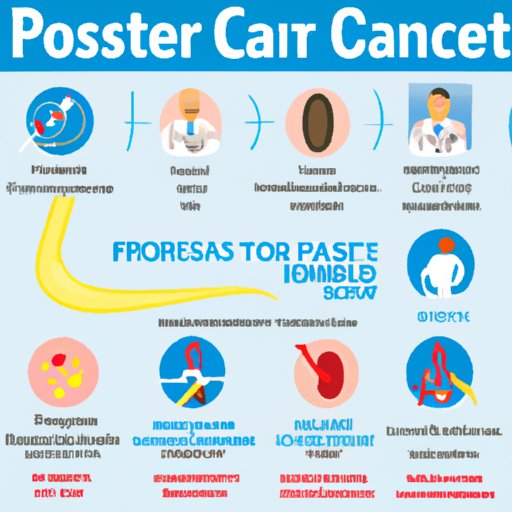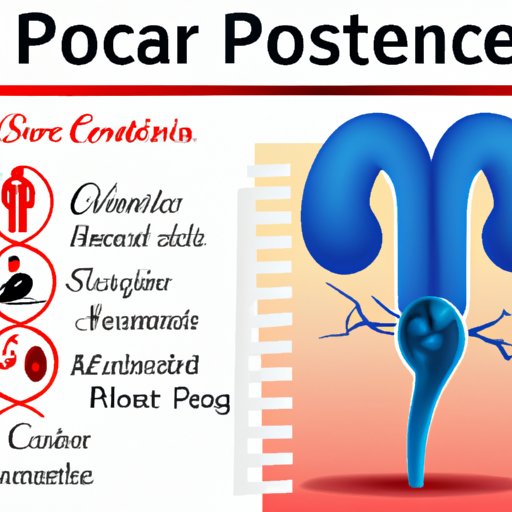
Introduction
Prostate cancer is one of the most common cancers in men, with over 190,000 new cases diagnosed each year in the United States alone. While this disease can be serious, the good news is that prostate cancer is often treatable and has a high survival rate when caught early. However, in order to catch it early, it’s important to understand the various symptoms that can indicate prostate cancer. In this article, we’ll take a deep dive into the top symptoms of prostate cancer, as well as some of the less common ones that you may not be aware of.

Understanding the Symptoms of Prostate Cancer: A Comprehensive Guide
Before we delve into specific symptoms, it’s important to understand what prostate cancer is and who is at risk. Prostate cancer is a type of cancer that develops in the prostate gland, a small gland located in men’s reproductive systems. While the exact cause of prostate cancer is not known, there are several factors that can increase a man’s risk of developing the disease, including age, family history, and lifestyle factors such as a diet high in red meat and low in fruits and vegetables.
The Top Signs You Shouldn’t Ignore: Recognizing Prostate Cancer Symptoms
So what are some of the signs that you may have prostate cancer? Here are some of the most common symptoms:
Difficulty urinating
One of the early signs of prostate cancer is difficulty urinating. This can manifest in several ways, including needing to strain in order to urinate, feeling like you can’t completely empty your bladder, or having a weak urine stream.
Frequent urination, especially at night
Another early symptom of prostate cancer is frequent urination, especially at night. If you find that you’re getting up to use the bathroom more than usual, or if you’re experiencing sudden urges to urinate throughout the day, this could be a sign of prostate cancer.
Weak urine flow
As the prostate gland becomes enlarged due to cancer, it can impede urine flow, resulting in a weaker stream than usual. This is another common symptom of prostate cancer that should be taken seriously.
Blood in semen or urine
If you notice blood in your semen or urine, this could be an indication of prostate cancer. While there are other possible causes for this symptom, it’s always best to get it checked out by a doctor to rule out prostate cancer or any other serious conditions.
Pain or discomfort in the pelvic area
Finally, pain or discomfort in the pelvic area can be another sign of prostate cancer. This could manifest as a dull ache, or as more sharp, intense pain. If you’re experiencing persistent pain in the pelvic region, it’s important to get it checked out right away.
Spotting the Early Warning Signs of Prostate Cancer
While the above symptoms are all indicators of prostate cancer, there are also some early warning signs that you can watch out for. One of the most important ways to catch prostate cancer early is to get screened regularly. Men between the ages of 55 and 69 should get a prostate-specific antigen (PSA) blood test and a digital rectal exam (DRE) each year.
Age and family history as risk factors
In addition to regular screenings, it’s also important to be aware of your risk factors for prostate cancer. As mentioned earlier, age and family history are two of the biggest risk factors for prostate cancer. Men over the age of 50 are at higher risk, and if you have a close family member who has had prostate cancer, your risk is also increased.
How to stay vigilant for early-stage symptoms
To catch prostate cancer early, it’s important to stay vigilant for early-stage symptoms. This means paying attention to any changes in your urination patterns, keeping an eye out for blood in your urine or semen, and being aware of any pain or discomfort in your pelvic region. It’s always better to err on the side of caution and get any symptoms checked out by a doctor as soon as possible.
Uncovering the Uncommon Symptoms of Prostate Cancer
While the symptoms we’ve discussed so far are the most common signs of prostate cancer, there are some lesser-known symptoms that are also worth knowing about. Here are a few to keep in mind:
Bone pain and fractures
Prostate cancer can spread to the bones, which can result in bone pain, fractures, and other skeletal problems. If you’re experiencing unexplained bone pain or are suddenly more prone to fractures, this could be a sign that prostate cancer has spread to the bones.
Swelling in legs and feet
Another uncommon symptom of prostate cancer is swelling in the legs and feet. This occurs when the cancer obstructs the flow of urine, causing it to build up in the body and lead to swelling.
Loss of appetite and weight loss
If you’re experiencing unexplained weight loss or a loss of appetite, this could be a sign that prostate cancer has advanced. As the cancer progresses, it can begin to affect your body’s ability to absorb nutrients, leading to weight loss and a lack of appetite.
A Closer Look at the Physical Symptoms of Prostate Cancer
Now that we’ve covered some of the various symptoms of prostate cancer, let’s take a closer look at some of the physical manifestations of this disease.
Changes in urination
As we’ve already discussed, changes in urination patterns are some of the most common signs of prostate cancer. This can include difficulty urinating, frequent urination, and weak urine flow.
Erectile dysfunction
Another physical symptom of prostate cancer is erectile dysfunction. As the prostate gland swells due to cancer, it can put pressure on the nerves and blood vessels that are necessary for achieving an erection.
Fatigue
Prostate cancer can also cause fatigue and a general feeling of tiredness. This is because cancer can cause your body’s immune system to work overtime, leading to feelings of exhaustion and lethargy.
Tenderness in the prostate gland
Finally, if you’re experiencing tenderness or discomfort in the prostate gland, this could be a sign of prostate cancer. This could manifest as a feeling of pressure or pain in the pelvic region, or as tenderness to the touch.
How to Recognize and Address Symptoms of Prostate Cancer
If you’re experiencing any of the symptoms we’ve discussed in this article, it’s important to take action as soon as possible. Here are some steps you can take to recognize and address symptoms of prostate cancer:
Making lifestyle changes
If you’re at risk for prostate cancer, making certain lifestyle changes can help to lower your risk. This could include eating a healthier diet, getting regular exercise, and quitting smoking if you’re a smoker.
Seeking medical attention
If you’re experiencing any of the symptoms we’ve discussed, it’s important to see a doctor right away. Your doctor can perform screening tests and help you to determine the best course of action if prostate cancer is detected.
Treatment options
If you are diagnosed with prostate cancer, there are several treatment options available depending on the stage of the cancer and the overall health of the patient. These can include surgery, radiation therapy, and hormone therapy.
5 Key Signs of Prostate Cancer to Know and Understand
To recap, here are the five key signs of prostate cancer that you should know and understand:
- Difficulty urinating
- Frequent urination, especially at night
- Weak urine flow
- Blood in semen or urine
- Pain or discomfort in the pelvic area
If you’re experiencing any of these symptoms, it’s important to take action and see a doctor as soon as possible. Regular screenings and staying vigilant for early-stage symptoms can help to catch prostate cancer before it becomes more serious.
Conclusion
Prostate cancer is a serious disease that affects millions of men worldwide. However, by understanding the various symptoms of prostate cancer and staying vigilant for early warning signs, you can help to catch this disease early and get the treatment you need to achieve a positive outcome. If you’re experiencing any of the symptoms we’ve discussed in this article, don’t hesitate to seek medical attention and get the care you need.





